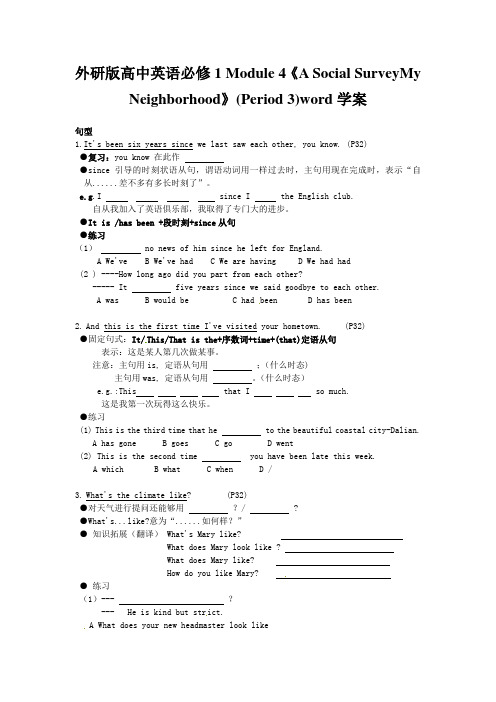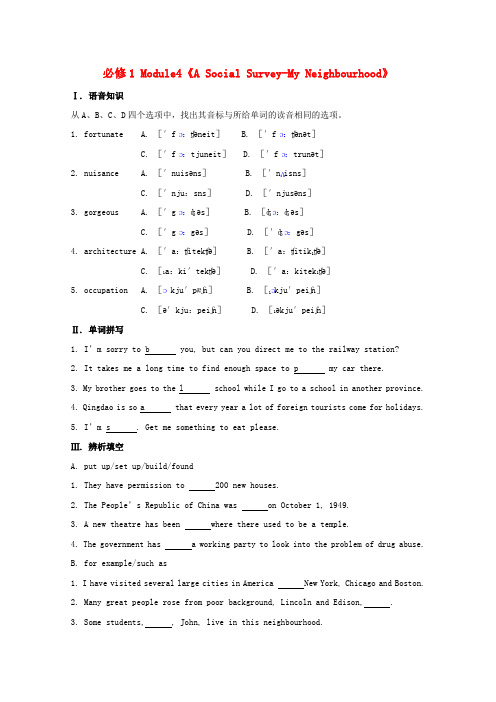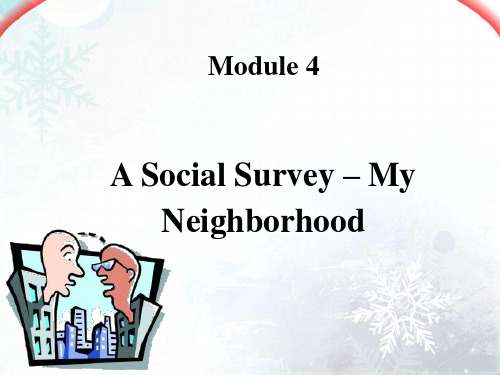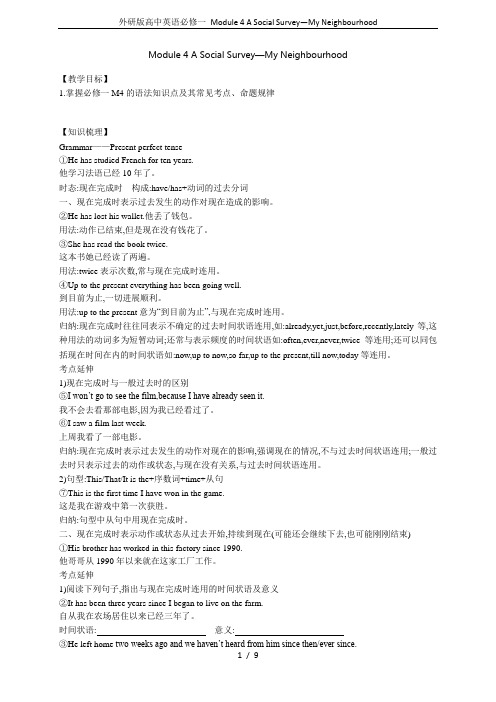2019-2020年外研版高中英语必修1 Module 4《A Social Survey-My Neighborhood》(Period 5)word学案
外研社版高一必修1_Module_4_A_Social_Survey-My_Neighborhood_课件2

1.This city lies in the southeast of China;
2.It is a seaside city; 3.It has a famous Island -----GuLangyu Island.
Xiamen
Brainstorming
interesting places local products
environment very clean, the air is fresh
tourist attractions
food
Sea food
suffer the air pollution , noisy
Shopping malls Jixian Panshan, Local flavor
Listen and choose the correct answer.
Module 4 A social Survey
north of China
east of China
south of China
between the Pacific Ocean
kangaroo
and the Indian Ocean
Guesswork: Where is it?
• Hint 1 It’s a coastal city , which is beautiful and clean .
1.John Martin is visiting ____a_______.
(a) Xiao Li’s hometown (b) a town near where Xiao Li lives (c) a shopping mall
2. Xiao Li lives ____b_____.
外研社版高一必修1_Module_4_A_Social_Survey-My_Neighborhood_ppt课件3

Write
a short report according to what you get from the survey about your classmates’ study in school. Use the present perfect tense when necessary.
附:
附:
(高考题)
答案:B
2. (NMET 1992) --Do you know our town at all? --No, this is the first time I ____here. A. was B. have been C. came D. am coming
附:
(高考题)
3. (NMET 1999) The price _____, but I doubt whether it will remain so. A. went down B. will go down C. has gone down D. was going down 答案:C
know live remain stay …
borrow give leave buy open put send …
Grammar 2 -3.Creative thinking(5m) Finish the missing part of the sentences.
1.
2.
3.
4.
Up to now, I’ve realized that he ______________________________________. Great changes _________________ in my hometown these years. So far as I know, my aunt ______________________________________. Professor Cartel ___________________ since a week ago.
外研版高中英语必修1 Module 4《A Social SurveyMy Neighborhood

外研版高中英语必修1 Module 4《A Social SurveyMy Neighborhood》(Period 3)word学案句型1.It's been six years since we last saw each other, you know. (P32)●复习:you know 在此作●since引导的时刻状语从句,谓语动词用一样过去时,主句用现在完成时,表示“自从......差不多有多长时刻了”。
e.g.I since I the English club.自从我加入了英语俱乐部,我取得了专门大的进步。
●It is /has been +段时刻+since从句●练习(1) no news of him since he left for England.A We'veB We've hadC We are havingD We had had(2 ) ----How long ago did you part from each other?----- It five years since we said goodbye to each other.A wasB would beC had beenD has been2.And this is the first time I've visited your hometown. (P32)●固定句式:It/This/That is the+序数词+time+(that)定语从句表示:这是某人第几次做某事。
۞注意:主句用is, 定语从句用;(什么时态)主句用was, 定语从句用。
(什么时态)e.g.:This that I so much.这是我第一次玩得这么快乐。
●练习(1) This is the third time that he to the beautiful coastal city-Dalian.A has goneB goesC goD went(2) This is the second time you have been late this week.A whichB whatC whenD /3.What's the climate like? (P32)●对天气进行提问还能够用?/ ?●What's...like?意为“......如何样?”● 知识拓展(翻译) What's Mary like?What does Mary look like ?What does Mary like?How do you like Mary?● 练习(1)--- ?--- He is kind but str ict.A What does your new headmaster look likeB How is your new headmaster likeC What's your new headmaster likeD How much do you like your new headmaster(2 )---How is Mary?---A She is beautiful and smart.B She is fine, thank you.C She is my English teacher.D I don't know.4. I'm starving! (P32)●口语,仅仅用于进行时态,表示感受专门饿e.g. Let's go to the restaurant quickly. I'm starving.5. Cities are exciting, interesting places to live (in). (P37)●本句中to live in作后置定语修饰名词places.不定式作后置定语,与所修饰的名词之间是逻辑上的动宾关系, in 在口语中常省略。
外研版高中英语必修1 Module 4《A Social SurveyMy Neighborhood

外研版高中英语必修1 Module 4《A Social SurveyMy Neighborhood》(Period 4)word学案【学习目标】1. 训练学生的阅读明白得能力。
2. 复述课文。
【学习重难点】提高阅读明白得能力。
Reading导学1. Fill in the formAn 1 and lively city — 2people 3 (adj.)climate 4 5 and 6 in summer, 7 8 in winterbusiness district 9 (adj.) 10 buildings and some great shopping 11western district 12 (adj.) really 13 parks14 Island 15 (adj.) and 16 (adj.) with some 17 (n.) just18 the water导学2. Multiple choice.1.According to the dialogue, we can know JM .A. visited XL's hometown againB. saw XL seven ye ars agoC. bought a beautiful dress for his wifeD. has seen quite a lot of China2.The following are what JM thinks of Xiamen EXCEPT .A. fortunateB. livelyC. friendlyD. attractive3.The dialogue takes place most probably .A. at the airportB. on Gula ngyu IslandC. in the business districtD. on the returning way from the airport4.If the dialogue develops, what's the talking topic for the followingdialogue?A. The food of XiamenB. The weather of XiamenC. The beautiful scenery of XiamenD. The touring industry of Xiamen导学3. Close the passage.Xiao Li is driving with John Martin on the way. It is 6 years 1 they last 2 each other. Though JM has seen 3 4 5 6 China and some 7 cities, this is the 8 time he 9 10 XL's 11 . 12 , an 13 city.They're talking excitedly with each other about 14 people, 15 , and 16 XL thinks of as a 17 . Meanwhile, they're passing a huge 18 19 , where the 20 is high, and they're enjoying the 21 business 22 , where there are 23 buildings and some great 24 25 where JM wants to buy some 26 . After that they're 27 the 28 and 29 the western 30 , th e most 31 part with pretty 32 . JM is surprised to find 33 Island — a34 and 35 island with some 36 37 just 38 the water.After a long drive, they will 39 the car and go to a fish 40 for 41 . JM is very happy and says that it 42 great and he is 43 .Cultural Corner导学1.1.How many reasons are mentioned in the passage that some villages are disappearing?A.TwoB. ThreeC. FourD. Five2.Sometimes villages remain because .A.the government offers help to build villagesB.villages are beautifulC.People from the cities bought houses in the villageD.Farmers don't want to leave their home3.Peopl e in the city like to buy houses in the countr yside because .A.the air is freshB.the environment is quietC.the price of the house in the city is too highD.they get tired of living in the city导学2. Fill in the blanks.In some countries in 1 Europe, 2 3 France, Spain and 4 , some villages are 5 . There are 6 reasonsfor this. Firstly, young vi llagers want to live a 7 life, so they move to the towns and don't 8 . Secondly, there are 9 jobs in the countryside so people move to the cities to fi nd 10 . 11 , farmers find 12 more and more 13 to 14 15 from their farms, so they 16 their land. However, sometimes villages 17 because people 18 the cities who can't 19 to buy a house in the city as a result of the rising 20 have 21 a "second home"in the village so that they can s tay 22 23 .All these things 24 many villagers are 25 to survive. We can only 26 that the villagers will 27 .。
外研版高中英语必修1module4《A Social Survey-My Neighborhood》课文阅读课件

Summary
In this period we have learned…
Homework
1.Surf the internet to find more information about Xiamen. 2.Based on the presentation above, write a description about Yantai
impression
lively, attractive, interesting
location
on the coast
people
friendly
climate
pretty hot and wet in summer, quite
cold in winter
tourism
a lot of tourists, a nuisance in summer
tourism
a lot of tourists, a nuisance in summer
business district Western district
high-rise buildings, shopping malls
the most interesting part, pretty parks
Gulangyu
gorgeousng architecture
Sentence pattern
It’s been six years since we last saw each other.
As is known, it’s been 148 years since Yantai No. 2 Middle School _w_a_s__f_ou_n_d_e_d__ ( found).
高中英语外研版必修一《module 4 a social survey-my neighbourho

点拨 (1)afford sth. 买得起某物,负担得起某物 afford to do sth. 负担得起做某事(的费用或代价) afford sb. sth.给予某人某物 (2)affordable adj. 能支付得起的 【点津】afford 意为“买得起,负担得起”时,常与can、could、be able to连用,后接名词、代词或不定式。
③ Being able to afford a drink would be a comfort in the tough times. 在困难时期,能够买得起一杯酒喝也是一件令人很宽慰的事。 ④We have spent nearly all our money, and we cannot afford to stay at a hotel .我们几乎花光了所有的钱,住不起宾馆了。 ⑤He is so busy. He cannot afford enough time with his son even if he wants to.他太忙了。他没有足够的时间来陪儿子,即便他想这样。 ⑥The programme affords young people the chance to gain (gain) work experience.这项计划给年轻人提供了获得工作经验的机会。
点拨
(1)bother about sth. 为某事烦恼 bother to do sth. 费心做某事 bother sb. with sth. 用某事麻烦某人 bother oneself about 为……操心/焦虑/困扰 why bother为何那么麻烦;没必要;何必 have no/much/little bother(in)doing sth. 做某事不费力/很费力/几乎不费力 (2)Sorry to bother you.很抱歉打扰你。 Don’t bother.别费事了。/不用麻烦了。
外研版高中英语必修一Module 4A Social Survey—My Neighbourhoodintroduction,reading and voca教案11

2. Listen to Part 2 and complete the chart.
Number of households
850
Number of manual workers
378
Total population
2. It’s two years since her husband died.
3. It’s two years since he lived there.
4. It’s three weeks since he smoked.
2. …this is the first time I’ve visited your hometown.
① --- Tom has grown taller than before recently .
--- _____, and _____.
A. So he has, so have you B. So he has, so you have
C. So has he, so have you D. So has he, so you have.
另外, put up还有其它意思:
3) He put up his hand to catch the teacher’s attention.举起,抬起
4) A new notice has been put up on the board.张贴,挂起
5) Will you put me up for the night?住宿,留宿
2800
Number of shop workers
183
Number of professional people
外研版高中英语必修一备课Module 4 A Social SurveyMy Neighbourhood

必修1 Module4《A Social Survey-My Neighbourhood》Ⅰ. 语音知识从A、B、C、D四个选项中,找出其音标与所给单词的读音相同的选项。
1. fortunate A. [′fɔ:ʧəneit] B. [′fɔ:ʧənət]C. [′fɔ:tjuneit]D. [′fɔ:trunət]2. nuisance A. [′nuisəns] B. [′nʌisns]C. [′nju:sns]D. [′njusəns]3. gorgeous A. [′gɔ:ʤəs] B. [ʤɔ:ʤəs]C. [′gɔ:gəs]D. [′ʤɔ:gəs]4. architecture A. [′a:ʧitekʧə] B. [′a:ʧitik1ʧə]C. [1a:ki′tekʧə]D. [′a:kitek1ʧə]5. occupation A. [ɔkju′pæʃn] B. [1ɔkju′peiʃn]C. [ə′kju:peiʃn]D. [1əkju′peiʃn]Ⅱ. 单词拼写1. I’m sorry to b you, but can you direct me to the railway station?2. It takes me a long time to find enough space to p my car there.3. My brother goes to the l school while I go to a school in another province.4. Qingdao is so a that every year a lot of foreign tourists come for holidays.5. I’m s . Get me something to eat please.Ⅲ. 辨析填空A. put up/set up/build/found1. They have permission to 200 new houses.2. The People’s Republic of China was on October 1, 1949.3. A new theatre has been where there used to be a temple.4. The government has a working party to look into the problem of drug abuse.B. for example/such as1. I have visited several large cities in America New York, Chicago and Boston.2. Many great people rose from poor background, Lincoln and Edison, .3. Some students, , John, live in this neighbourhood.4. That sum of money is to cover costs travel and accommodation.C. alive/live/living/lively/lovely1. He is probably the best known architect.2. The girl’s rosy cheeks made her look very .3. Millions of animals are shipped around the world each year.4. The discussion came when an interesting topic was brought in.5. The teacher has a strange way of making his lessons and interesting. Ⅳ. 用括号内所给动词的适当形式填空1. You don’t need to describe her. I (meet) her several times.2. I (receive) no reply from her so far.3. It (be) six years since they (get) married.4. This is the third time I (visit) Hong Kong. The second time I (come) here was on Christmas Day last year.5. With the help of high technology, more and more new substances (discover) in the past years.Ⅴ. 翻译句子1. 到现在为止我们已经开办了两家新的医院。
【英语必修一外研版】Module 4 A social Survey-My Neighbourhood:Period 5-教学文档

Period 5WritingGroup-workDiscussing task 1Talk about : First, a few sentences to introduce yourself briefly ;second, briefly introduce which part of China, which city you live in;finally, briefly introduce what kind of building you live in,on which floor, and what's your house like .Is it near or far from your school?Discussing task 2What are around your neighbourhood?Such as schools, shops ,markets, hospitals, factories, buses, a park, a zoo,some other public facilities.What about your neighbours, people living in the neighbourhood?Do you have a safe and peace neighbourhood to live in?Sentences help:There is..., a... Has just been built in out neighbourhood recently; Since there is../a..has just been built here, it is convenient for us to ....., ....is within only ten minutes's walking distance.Discussing task 3What's your feeling about living here?Independent workWriting taskAccording to what you9 have discussed above, write down a passage._____________________________________________________________________ _____________________________________________________________________ _____________________________________________________________________ _____________________________________________________________________ _____________________________________________________________________ _____________________________________________________________________ The title is My neighbourhood.You must write your composition in three paragraphs following your discussion steps. Group-workExchange your compositions in groups to help each other to correct, learn or improve. T will pick a few of your work to show to the class on the screen.Hand in your compositions for your T to judge.第 1 页。
英语:(外研版,必修1)课件:Module 4 A Social Survey-My

2. 非延续性动词 (终止性动词/短暂性动词)
不能和表示一段时间的状语连用,如: come, start, begin, leave, arrive, reach, open, close, give, lend, borrow, finish, break, see, hear, notice, find, understand, die 等。
而一般过去时长用非持续性动词,如: come, go, leave, start, die, finish, become, get married 等。
延续性动词与非延续性动词:
1. 延续性动词可以与表示一段时间的状 语连用,如: live, study, work, teach, stay, read, play, fly, talk, rain, eat, run 等
A. How long were; being
B. How long have; got
C
C. How long have; been
D. How long did; get
2. It is the most instructive lecture that I
___D____ since I came to this school. (2011湖南)
Module 4
A Social Survey – My Neighborhood
现在完成时
现在完成时用来表示之前已发生或完成 的动作或状态,其结果的确和现在有联 系。动作或状态发生在过去但它的影响 现在还存在;也可表示持续到现在的动 作或状态。其构成: have (has) +过去分 词 John has broken his left leg.
外研版高中英语必修一 Module 4 A Social Survey—My Neighbourho

Module 4 A Social Survey—My Neighbourhood【教学目标】1.掌握必修一M4的语法知识点及其常见考点、命题规律【知识梳理】Grammar——Present perfect tense①He has studied French for ten years.他学习法语已经10年了。
时态:现在完成时构成:have/has+动词的过去分词一、现在完成时表示过去发生的动作对现在造成的影响。
②He has lost his wallet.他丢了钱包。
用法:动作已结束,但是现在没有钱花了。
③She has read the book twice.这本书她已经读了两遍。
用法:twice表示次数,常与现在完成时连用。
④Up to the present everything has been going well.到目前为止,一切进展顺利。
用法:up to the present意为“到目前为止”,与现在完成时连用。
归纳:现在完成时往往同表示不确定的过去时间状语连用,如:already,yet,just,before,recently,lately等,这种用法的动词多为短暂动词;还常与表示频度的时间状语如:often,ever,never,twice等连用;还可以同包括现在时间在内的时间状语如:now,up to now,so far,up to the present,till now,today等连用。
考点延伸1)现在完成时与一般过去时的区别⑤I won’t go to see the film,because I have already seen it.我不会去看那部电影,因为我已经看过了。
⑥I saw a film last week.上周我看了一部电影。
归纳:现在完成时表示过去发生的动作对现在的影响,强调现在的情况,不与过去时间状语连用;一般过去时只表示过去的动作或状态,与现在没有关系,与过去时间状语连用。
- 1、下载文档前请自行甄别文档内容的完整性,平台不提供额外的编辑、内容补充、找答案等附加服务。
- 2、"仅部分预览"的文档,不可在线预览部分如存在完整性等问题,可反馈申请退款(可完整预览的文档不适用该条件!)。
- 3、如文档侵犯您的权益,请联系客服反馈,我们会尽快为您处理(人工客服工作时间:9:00-18:30)。
2019-2020年外研版高中英语必修1 Module 4《A Social Survey-My Neighborhood》(Period 5)word学案
【学习目标】:复习现在完成时。
一、现在完成时的概念:表示动作发生在过去,对现在造成一定的影响。
结构:主语 + have/has + 过去分词
二、现在完成时的基本用法:
1.表示动作在说话时已经完成,但对现在产生某种影响。
e.g.:I have had breakfast and I am full now.
She has read the book and she knows som ething about it.
2.表示动作发生在过去,一直持续到现在,可能还会继续进行下去。
(动词一般是延续性动词)
e.g.: They have lived here for 2 years.
Tom has taught in this school till now.
3.和现在完成时连用的一些时间状语:ever, never, already, yet, recently, lately, just, once, …times, so far, till now, up to now, these years, for+段时间,since+表示过去的点时间。
三、现在完成时的一些特殊用法:
1.在It/This is the first (second, third…) time that …结构中,that从句中要使用现在完成时。
e.g.: This is the third time that I have met him.
2. 在It is/has been + 时间段+ since…结构中,since从句中要使用一般过去时。
e.g.: It is 3 years since they came here.
四、现在完成时和一般过去时的区别。
现在完成时强调现在,表达的是过去发生的事对现在造成的影响。
一般过去时强调过去,表达的是过去发生的某个事,一般有表示过去的具体的时间状语。
e.g.:— Have you had breakfast?
— Ye s. I had my breakfast just now.
自我检测:
1.—What is the price of petrol these days?
—Oh, it _____ sharply since last month.
A. is raised
B. has risen
C. has arisen
D. is increased
2. His sister left home in 1998, and ______ since.
A. had not be en heard of
B. has not been heard of
C. had not heard of
D. has not heard of
3. — Why does the lake smell terrible?
— Because the water ________.
A. have pol luted
B. is being polluted
C. has been polluted
D. have been polluted
4. — The window is dirty.
— Yes, I know. It ______ for weeks.
A. hasn’t cleaned
B. didn’t clean
C. wasn’t clean ed
D. hasn’t been
cleaned
5. Judy is going to marry the sailor she _____ in Rome last year.
A. meets
B. met
C. has met
D. would met
6. So far this year we _____ a fall in house price.
A. saw
B. see
C. had seen
D. have seen
7. — Has your classmate come back from America?
— Yes, he _____ there for eight years.
A. has stayed
B. stays
C. stayed
D. had stayed
8. I know a little about Italy as my wife and I _____ there several years ago.
A. are going
B. had seen
C. went
D. have been
9. —Alice came back home the day before yesterday.
— Really? Where _____ at all?
A. had she been
B. had she gone
C. has she been
D. has she gone
10. The manager _____ the worker how to improve the program since 9 a.m.
A. has told
B. is telling
C. has been telling
D. will have told
短文改错:
Dear Lin Hua,
I hear from you yesterday. I learn that you feel very nervously before the exam s.
And I also know you are under too many pressure these days. Now let me give you some
advices. First, you need to sleep for at least eight hours every day. If you don’t
has enough sleep, you feel very tired. Second, you should do s ome exercise such
as run and playing basketball. Third, it’s very good for you to listen to the music,
watch TV, or surf the Internet after a long time’s study. In a words, you should
learn to relax you.
Wish you good luck on your exams!
Yours,
Mr Liu
1. hear→heard
2.nervously→nervous
3. many→much
4. advices→advice
5. has→have
6. feel 前加will
7. run→running
8. 去掉the
9. words→word 10. you→yourself。
